|
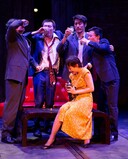 The King of Hell’s Palace – Hampstead Theatre It is possible to feel compassion without empathy. I realised that this week while watching a play set in rural China in the '90s, about two families, and by extension a society, destroyed by blood. Real blood, the red stuff that flows in the veins of us all but which, it turns out, is worth actual money when sold for its plasma by poor village people who think they’ve discovered the secret of the universe. What? Money for selling what’s in your own veins? Money without working for it? Money that will buy new sneakers or a kitchen blender? 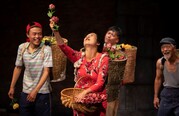 But what if nobody tells you that all they want is the plasma – the red stuff – and they’re going to give you back what’s left when they’ve extracted it – the yellow stuff? Well, that sounds all right, doesn’t it? Unless it turns out that some of that yellow stuff you get is not yours, it’s been mixed with other people’s yellow stuff and some of those other people are HIV positive? Nasty. So, of course, as soon as the Government discovers that this is happening to you it stops the plasma collection immediately, right? Well, no, because there’s too much money being made from selling it to unsuspecting customers in other countries so, instead of stopping it, they cover it up. And this can’t be happening, can it, when the people who are doing this to you are representatives of your own Governments’ health service? If it’s the Government it must be all right, no?  This is all true, as documented in a searing article in the printed programme by the very doctor who discovered both the contamination of the blood and the cover up which is, by the sheer baldness of the stated facts, infinitely more dramatic than the play unfolding on stage. Dr Wang Shuping was in the audience at Hampstead on the opening night of The King of Hell’s Palace and by her very real presence gave credence to the horror that Frances YaChu Cowhig’s play depicts. An all-British Asian cast struggles with the stilted dialogue which I imagine is intended to reflect the translation of Chinese country speech. Only the American actor, Celeste Den, as the doctor at the heart of the story, manages successfully to convey the conflict between the Chinese family loyalties and the educated person’s understanding that sometimes whistle-blowing is the only available choice, even if it blows up hundreds of years of family cohesion. But whatever we think about the play and its strengths and weaknesses, the facts at its core are indisputable and horrible. And, as witness a new blood scandal in China in February of this year, it’s still going on. Compassion, yes. Empathy, no.  A Very Expensive Poison – Old Vic It’s not been a cheerful week, this week, on any front. Quite apart from the poisonous politics on both sides of the Atlantic, it hasn’t been a healthy week in the theatre either. The Chinese are killing their own citizens by giving them AIDs at Hampstead Theatre and the Russians are knocking off their ex-spies with polonium210 at the Old Vic. And, as the old joke goes, I’m not feeling too well myself. No, I do know it’s not funny. And it’s not at all difficult to empathise with any of them although compassion is in short supply. 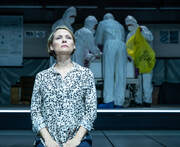 Lucy Prebble’s new play is about the poisoning and death of Alexander Litvinenko and his wife Marina’s tireless and ultimately successful efforts to get the blame placed squarely on the shoulders of Vladimir Putin and his regime. Litvinenko not only knew who had planned his killing but told the detectives assigned to his case that only Putin had the authority to order his death and, as a former FSB officer himself he was in a position to know. 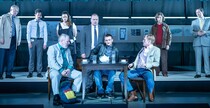 Once it became clear that Litvinenko was in fact dying and that he had been poisoned (although at that time nobody knew exactly what poison had been used) a full murder inquiry was launched by Scotland Yard even though Litvinenko was still alive and able to help the detectives who were working on his case. As a former investigator himself he had kept careful notes of meetings with other Russians including the two Keystone Kops who were his actual murderers. With a poison so deadly that an amount equivalent to a grain of sand would kill, they muffed it three times before getting it into the green tea that killed him. Litvinenko said that the tea was so foul-tasting that he drank barely a few sips. But that was enough.  It took Marina eight long years to get the public inquiry she wanted into Litvinenko’s death and for all this irrefutable information to come to light but it finally happened in 2016 and her faith was vindicated. The High Court judge who presided said that Putin and his head of the FSB had personally approved the operation. Marina’s QC said that Vladimir Putin was “a common criminal dressed up as a head of state”. 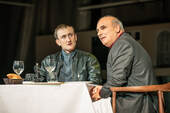 A Very Expensive Poison is blessed with two very fine performances from Tom Brooke and MyAnna Buring as Alexander and Marina Litvinenko, three, if you count Peter Polycarpou’s explosive turn as the oligarch Boris Bereszovsky and as Mikhail Gorbachev, which I do. I’m always surprised to see Brooke being cast in a leading role because he’s so self-effacing and always looks as though he’s about to cry, but he works all the time and has one of those faces which reflect his character perfectly. MyAnna Buring is properly indomitable and fearless as Marina with exactly the right touch of humour to offset the ghastly seriousness of the subject. The end of the play, when she steps out of Marina’s character to talk to the audience as herself, or rather as Prebble, is problematic but effective as she and several audience members read from the judge’s findings. Good stuff.  Falsettos – The Other Palace If you don’t have to be a murderess to play Lady Macbeth, why would you need to be Jewish to perform in Falsettos, which is New York Jewish to its core? As Laurence Olivier once said to Dustin Hoffman who was making himself ill trying to get into his character for Marathon Man, “Try acting”. So I found the fuss over the fact that Falsettos has no Jewish cast members or ‘creatives’ overblown and silly. Until I saw it, that is. At that point I thought it might have been much improved by the addition of a few Jewish faces in the cast, although it should be said that there are a lot of Jewish actors in the London theatre and I haven't noticed much, if any, discrimination against them.  The fault here isn’t the actors, it’s the direction. A show choc-full of Jewish jokes, many of them funny, intended by its writers to be delivered with that particular brand of in-your-face but vulnerable New York Jewish humour, is here performed with wavering New York accents and an earnestness that betokens the English trying to be fair to the foreigners. Which, let’s face it, is old-fashioned and embarrassing. 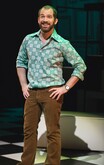 This through sung musical by James Lapine and William Finn has some really good songs which I remember as having been both touching and funny in the original. This is a revival, so you could argue I don’t remember it as well as I might, having last seen the first act in 1981 and the sequel, which is the second act, in 1990. The central theme is family. What is a family and does it cease to exist as an entity when the father leaves the mother for another man? What happens to a child, just coming up on his barmitzfah, when he finds himself with a mother, two fathers, and a stepfather?  Add to that the horror that occupied us all at that time, the spectre of AIDs, which hovers over the second half and finally takes it over. This was urgent then. Thank God it isn’t now. And it has been better treated elsewhere, for example, in The Inheritance, here it just seems to be an awkward adjunct to the family machinations.  The cast sings beautifully, but without understanding the underlying Jewish ethos that informs both music and lyrics. It is not their fault that the director/choreographer has given them undanceable movements which make them look ridiculous nor that the designer has made a set that requires so much mechanical moving about the stage that it almost becomes another character. 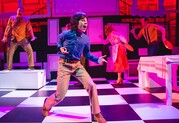 Of course you don’t have to be Jewish to play a Jew, but you can’t play a Jew without the empathy and compassion that is central to that ethnicity. This director has leeched both from all the characters in this production. Hasn’t she ever met a New York Jew? You don’t have to be Jewish but you have to know it when you see it. 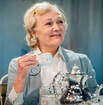 For Services Rendered – Jermyn Street Theatre My grandmother-in-law used to refer to W. Somerset Maugham as “my house playwright”, and rather less dismissively as “dear Willie”. He, in return, rather grudgingly admitted that she had “turned herself from an indifferent actress to an extremely competent one”. She had premiered a number of his plays when, during the First World War, she had been the first woman ever to run a West End theatre but that was, she confided to me, “because all the men were away at the War, darling, and I was left in London”. She was, of course, Dame Gladys Cooper and I loved her dearly, although I only met her at the end of her life when she returned to England from Hollywood where she had lived and worked for Metro Goldwyn Meyer as a contract player. In her heyday she was a great star of both movies and stage. Later she even had a television career. Her last major role was as Mrs Higgins, Henry Higgins’ beautiful and elegant mother in the movie of My Fair Lady where she steals every scene she’s in. 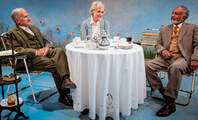 For Services Rendered which Maugham wrote in 1932 and is now in revival at Jermyn St, is about the effects of the War on one English family. It is melodramatic and a thought too overwrought but as the toll on each member of the family is exposed to the light, it still has the power to move and shame. The cherished son has lost his sight, the oldest daughter (Rachel Pickup) has lost her fiancé, just one casualty of an entire generation of young men who died in that terrible war, and her mind. The younger daughters have, in differing ways, lost their youth and future, and the mother, in a beautifully understated performance from Diane Fletcher, has literally lost her way and her way of life. All the surviving men are broken. It contains one of the strongest anti-war speeches in the dramatic literature which, I suspect, could only have come from a playwright who had been there. The director, Tom Littler, has once again unearthed a play which needed a new look and given it a first-class production, proving that the smallest theatres can have the biggest dreams.
1 Comment
18/9/2019 02:55:14 pm
Miss you. Hoping to be in London October 22 or thereabouts. Which of the above are most-sees, if still on?
Reply
Leave a Reply. |
AuthorRuth Leon is a writer and critic specialising in music and theatre. Archives
March 2024
Categories
All
|
 RSS Feed
RSS Feed
